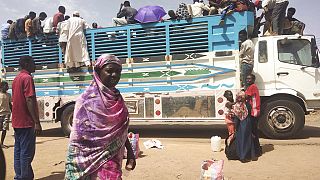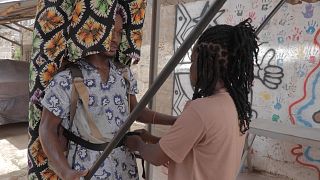The Morning Call
Not so long ago in the village of Tababou, 600 kilometres off Lome, Togo’s capital, Ousmane Kantcho had to travel miles and miles outside the village in order to charge his mobile phone or watch a football match. The young Togolese and his family, without access to electricity, also had to sleep every night enduring darkness.
Life was slow, and many tasks became a hassle. Today there is at least some light and Ousmane’s wife Gnassa can feel the difference. “Before, there was no light. We had to cook in the dark. Now, thanks to this flashlight, I can cook without difficulty” she says.
Ceiling lamps, Television, radio, plugs and sockets now fill their home. This comfort that would seem so commonplace to many is now made possible thanks to a small 50-watt solar panel perched on the roof of Ousmane’s house.
In 2018, the Togolese government launched an electrification plan for the country, in partnership with the private sector: the aim? to achieve 100% coverage by 2030, at a total cost of $1.5 billion.
Alassani Damoni, the Electrician in charge of solar panels in Tababou village couldn’t be prouder. For him the solar panel has been of great benefit to the village.
Only 30% of Togo land area – was connected to electricity in 2016-2017, compared to almost 50% today. With renewable energy, the west African country which imports more than half of its energy needs from Nigeria and Ghana, aims to facilitate the growth of its SME sector, and provide access to electricity for its eight million inhabitants even in the most remote areas of the country.





![Africanews celebrates fifth anniversary [Night Shift]](https://static.euronews.com/articles/stories/05/57/72/74/320x180_cmsv2_6b1e7837-a917-526b-b3b4-4582a3f8bcac-5577274.jpg)
![Africanews celebrates fifth anniversary [Morning Call]](https://static.euronews.com/articles/stories/05/57/72/70/320x180_cmsv2_a6c857d4-80a3-510a-88e6-f060ea8d9ee9-5577270.jpg)






04:46
Young Senegalese women market agribusiness on YouTube
01:37
Saint Helena: how a tiny island is trying to achieve carbon neutrality
Go to video
Nigerians press for solar jobs and electricity, with little success
02:18
Animation dreams in Togo: Michel Ocelot inspires at the FIGA festival
02:20
Togo football legend Emmanuel Adebayor marks retirement in Lomé match
00:54
Togo's preparation for Algeria: training session held in Annaba